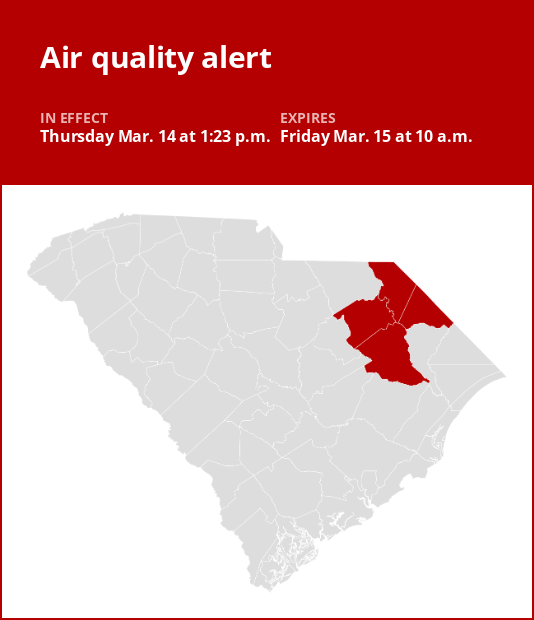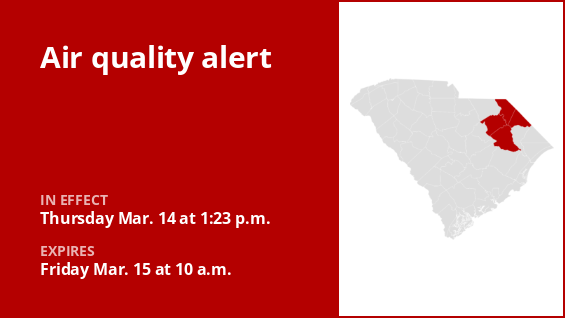The National Weather Service issued an air quality alert on Thursday at 1:23 p.m. valid until Friday at 10 a.m. for Dillon and Florence counties.
“The South Carolina Department of Health and Environmental Control has issued an Air Quality Alert for fine particulates for Darlington, Dillon, Florence, and Marlboro counties in South Carolina. An Air Quality Alert means that the fine particulate concentrations within the specified areas may approach or exceed unhealthy standards for individuals sensitive to particle pollution. The smoke/particulate matter concentrations are likely due to numerous prescribed burns across the region. DHEC recommends that individuals with respiratory health issues limit time spent outdoors and/or move all activities indoors to avoid the smoke or fine particulates. Keep windows and doors closed. Run an air conditioner if you have one but keep the fresh-air intake closed and the filter clean to prevent outdoor smoke and fine particulates from getting inside,” according to the weather service.
This alert is in effect until Friday at 10 a.m.

Air quality Alerts: NWS prescribes safety measures
When an air quality alert is in effect, following the weather service guidance is pivotal. Here are some simple tips from the weather service for safeguarding your well-being:
1. Seek shelter indoors when possible:If you can, take refuge indoors, especially if you have respiratory concerns, underlying health conditions, or belong to the senior or child demographics.
2. Trim outdoor activities:When you can’t avoid going outdoors, keep outdoor activities to the bare essentials. Reducing your time outdoors is the key.
3. Scale back pollution-inducing practices:Be mindful of activities that increase pollution, like driving cars, operating gas-powered lawnmowers, or using motorized vehicles. Limit their usage during air quality alerts.
4. No open burning:Resist the urge to burn debris or any other materials during an air quality alert. This practice only adds to the air pollution problem.
5. Stay well-informed:Stay updated by tuning in to NOAA Weather Radio or your preferred weather news outlet. Staying informed helps you make wise choices regarding outdoor activities during air quality alerts.
6. Respiratory health caution:If you have respiratory problems or underlying health conditions, exercise extra caution. These conditions can increase your vulnerability to adverse effects from poor air quality.
By adhering to the advice from the weather service, you can enhance your safety during air quality alerts while reducing your exposure to potentially harmful pollutants. Stay aware, stay protected, and make your health a top priority.







